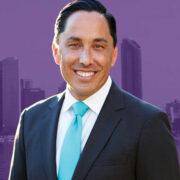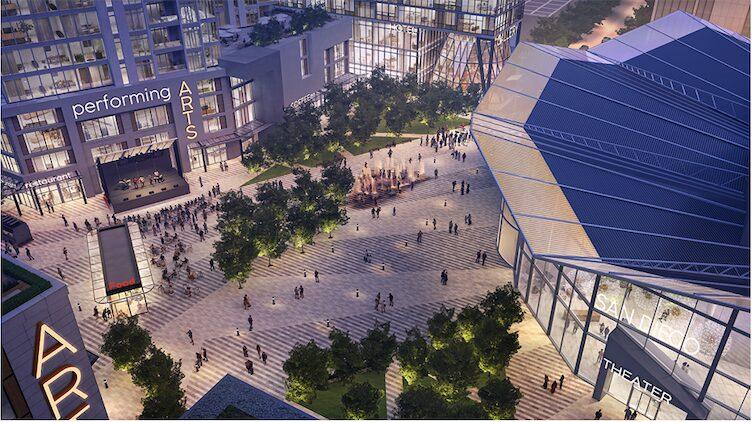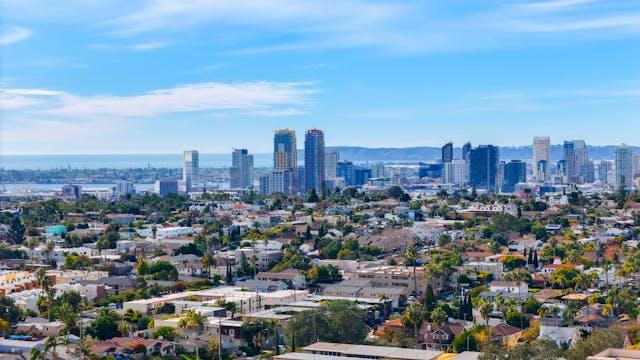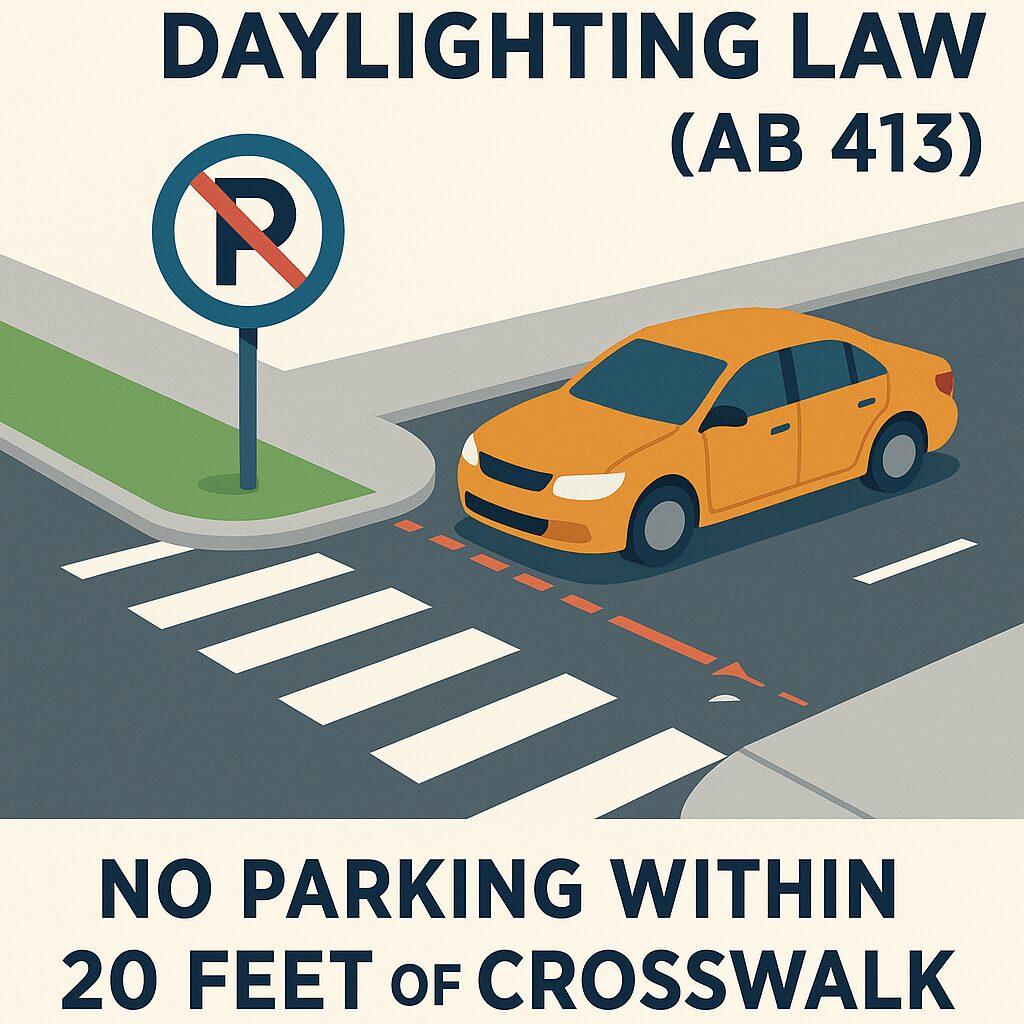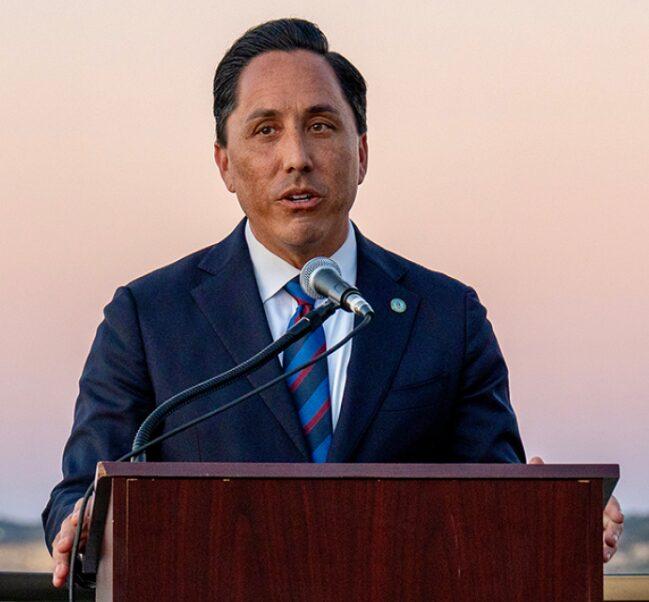Mayor’s state of the city details significant progress made on San Diego’s most critical issues
SAN DIEGO – In his fourth State of the City address as the 37th Mayor of the City of San Diego, Mayor Todd Gloria detailed the considerable progress his administration has made on the issues that concern San Diegans the most – public safety, homelessness, housing affordability and infrastructure – and plans to build on that progress in the coming years.
In his 2021 address, in the depths of the pandemic, Mayor Gloria declared the state of the city to be “fragile.” The next year, he said the city was “ready” to embark on the long road toward realizing its potential. Last year, he talked of how the city was “rising” to overcome the challenges it faced.
On Wednesday, January 10, the mayor said that as a result of the considerable progress his administration is making, “the state of our city is getting stronger every day. We are stronger than yesterday, and we’ll be even stronger tomorrow. We have more work to do, but we have proven that, together, we are up to the task. We will keep making progress, we will keep getting things done until the job is done!”
In his address, Mayor Gloria made the following announcements:
- New executive order on housing: Doubling down on an executive order he signed last January to expedite permits for 100% affordable housing projects, the mayor announced that he has signed a new executive order Wednesday requiring all relevant city departments to review new housing projects under the city’s Complete Communities program within 30 days, dramatically speeding up a process that currently can take up to 12 months. Complete Communities is a transit-oriented incentive program that allows home builders to expand their projects in exchange for building a certain number of affordable homes.
- Major expansion of homeless shelter options: Consistent with the city’s Comprehensive Shelter Strategy, the Mayor announced his intention to increase the number of shelter beds for people experiencing homelessness by at least 1,000 by the beginning of 2025. This will be a net increase, over and above the existing beds in Golden Hall and in East Village that will need to be relocated.
- Support for amending Proposition 47: In light of alarming crime trends involving the illicit drug trade and organized retail theft, Mayor Gloria announced he will support statewide action to amend Proposition 47, which passed in 2014, reclassifying certain drug and theft crimes as misdemeanors. The mayor noted that the law was being exploited and needs to be updated in order to meet its objectives of reducing overincarceration and recidivism while addressing its unintended consequences.
- Abandoned library to become housing: In a longer-term action, the city will embark on an ambitious proposal to redevelop the site of the old Central Library Downtown to create additional shelter space as well as hundreds of new affordable, permanent homes for low-income and formerly homeless San Diegans.
- Honoring Peter Seidler: The mayor announced that he has initiated the process to rename one of the streets that leads to Petco Park as “Peter Seidler Way,” honoring the late San Diego Padres chairman’s legacy and his work to address homelessness in San Diego.
- Philanthropic campaign to help tackle homelessness: The city is launching a philanthropic campaign to help carry out plans to address homelessness. Called “San Diegans Together Tackling Homelessness,” the campaign already has commitments totaling $250,000.
- Citywide project labor agreement: The city has reached agreement with the San Diego County Building Trades Council on a citywide project labor agreement that will apply to all major construction projects. The agreement will be up for City Council consideration in the coming month.
As he’s done in his past two State of the City addresses, Mayor Gloria focused exclusively on the four challenges that concern San Diegans most – public safety, homelessness, housing and infrastructure.
Public safety
Touting San Diego as one of the safest cities in the country, Mayor Gloria noted that in 2023, the most serious crimes fell again in the city: Murder and rape were down nearly 12% and 16% respectively. Robbery and burglary were down 7% and 16%, respectively.
The city opened a first-of-its-kind childcare facility for police officers to ease the parenting burden created by the nontraditional hours officers work.
“Now, rather than losing officers to other agencies, we’re seeing officers choose to come work for the San Diego Police Department,” Mayor Gloria said, adding that the city has also improved recruitment and retention in the Fire-Rescue Department.
Police Chief David Nisleit has announced that he will retire in June 2024, and the city has begun a national search with community forums being held in each Council district to solicit input from residents on what they want to see in the next police chief. In his address, Mayor Gloria announced that Chief Colin Stowell will also retire in 2024 and that the city will soon be launching a national search for his replacement as well.
Last year, Mayor Gloria secured the City Council‘s approval for the use of Smart Streetlights and Automated License Plate Recognition technologies as critical tools to investigate and solve serious crimes. “And we did so while outlining clear rules of the road to protect San Diegans’ privacy rights,” he said.
The mayor continued to warn of the deadly consequences of illicit fentanyl, which is killing hundreds of people every year.
“Our legislators in Sacramento must act, and tonight I am calling on them, yet again, to do so,” Mayor Gloria said. “I will keep coming back again and again for as long as it takes until the legislature passes laws that will hold the callous dealers of this deadly poison accountable.”
Homelessness
In 2023, Mayor Gloria took substantial action to address homelessness in San Diego, including the continued expansion of traditional shelter capacity and the city’s successful Safe Parking Program.
Working with City Councilmember Stephen Whitburn, Mayor Gloria launched a Safe Sleeping Program to bring more unsheltered San Diegans off the streets and out of danger. The program includes two sites offering space for up to 1,000 people. In just half a year, this option has moved more than 600 people off the streets.
All told, since April 2021, the city has more than doubled the number of options for people experiencing homelessness to come off the street.
City-funded outreach, shelter and family reunification programs have combined to successfully place more than 1,400 formerly homeless San Diegans into permanent housing in 2023, bringing the three-year total to 3,603.
In conjunction with the launch of the Safe Sleeping Program, Mayor Gloria and Councilmember Whitburn also collaborated to pass and implement the Unsafe Camping Ordinance, which bans tent encampments on public.
“I can report that the new law is working as intended,” Mayor Gloria said. “We are clearing encampments without widespread arrests. Since the ordinance passed in June, only one person has been arrested, but hundreds have accepted shelter.”
In Mayor Gloria’s 2022 State of the City address, he called on the state legislature and the governor to fix California’s badly broken behavioral health system. Months later, he stood with Gov. Gavin Newsom as he signed into law the CARE Act, which created a new court-based program for people suffering from mental illness to access treatment.
In 2023, working with Sen. Susan Talamantes Eggman and as chair of the bipartisan Big City Mayors coalition, Mayor Gloria championed conservatorship reform legislation and got it signed into law.
To help build out the infrastructure needed to provide the treatment required by these reforms, Mayor Gloria reiterated his strong support for Proposition 1. Slated to go before California voters in March, the ballot measure will generate the funding necessary to add more than 11,000 new behavioral health treatment beds and nearly 27,000 new outpatient opportunities statewide.
The San Diego City Council on Tuesday, January 9 joined the Mayor in officially supporting Prop. 1 by way of a resolution passed unanimously.
Housing
The mayor announced that a preliminary analysis shows that the city permitted approximately 8,000 homes in 2023 – a 51% increase over the roughly 5,300 homes permitted in 2022. Approximately one third of the homes permitted in 2023 were deed-restricted affordable housing.
The vast majority of the homes permitted last year – 2,063 of them – were permitted under a program called Affordable Housing Permit Now, created through an executive order Mayor Gloria signed moments before delivering his 2023 State of the City address. That order accelerated housing production by requiring permit applications for 100% affordable housing projects to be reviewed in 30 days or fewer. The Mayor announced that the city has exceeded that requirement, reviewing projects within nine days, on average.
To continue this forward momentum, Mayor Gloria in 2023 secured approval of a second Housing Action Package as part of his Homes For All of Us initiative, which includes a number of policy reforms that will make it easier to build affordable and middle-income homes. Among other things, Housing Action Package 2.0 will make it easier to create new student housing and single-room apartments for low-income San Diegans, build more three-bedroom homes for middle-income families, protect people from being displaced from their communities and turn underused commercials sites into housing.
In addition to policy reforms, the city is investing directly into affordable housing programs. In 2023, through the Bridge to Home initiative, the city pledged $15.4 million in gap-financing assistance to five affordable housing projects that total 400 homes for low-income households. This brings the total Bridge to Home investment to roughly $63 million for 16 projects through three rounds of funding, including 1,337 affordable apartments, with 368 set aside for people experiencing homelessness.
“As a renter myself, I understand the housing reality of today,” Mayor Gloria said. “My housing policies are designed to send a clear message: To every hardworking San Diegan, this mayor wants there to be a place for you in this city. To every young person, that I want you to stay in the city that helped raise and educate you. To every senior on a fixed income, that you shouldn’t have to spend your golden years worried that you’ll lose your home.”
Infrastructure
Mayor Gloria detailed how recent record budget funding for infrastructure is resulting in significant progress in road repair across San Diego.
The city repaired or resurfaced 252 miles of roadway in 2023. That’s nearly a 20% increase over 2022 and a 57% increase over 2021. Over the past three years, the city has repaired or resurfaced nearly 627 miles of city streets – close to 17% of the total road network.
City crews filled 61,305 potholes in 2023 – a 94% increase over the prior year and a 122% increase over 2021.
As promised in the mayor’s 2023 State of the City address, the city updated its Street Preservation Ordinance to ensure that public and private utilities that tear up San Diego’s roads restore them to as-good or better condition than they found them.
Looking forward, the city in 2023 conducted the most exhaustive pavement-condition study it’s ever undertaken to provide updated data that will guide decisions on which streets to repair and in what order.
The mayor also provided updates on sidewalk and streetlight repair and detailed the city’s investments in parks in all corners of San Diego.
The city opened four new parks and upgraded 10 others in 2023, bringing the three-year total to 19 new parks and upgraded 31 existing parks. During the next two years, the city anticipates creating 16 new parks and upgrading 34 more.
“Crumbling roads. Broken streetlights. Cracked sidewalks. Decaying pipes and stormwater culverts. For the past three years, we have been addressing these needs through record infrastructure investments, solid data to guide decisions and policy reforms that ensure we’re prioritizing the projects that are most needed and delivering them equitably and in keeping with our ambitious climate goals,” Mayor Gloria said.
As he closed his speech, Mayor Gloria said that even with the considerable progress the city has made in the past three years, there’s still much work to do.
“All of us can visualize the kind of San Diego we want to live in, the kind of city we want today and the kind of city we want to leave to our grandchildren tomorrow,” he said. “We, as a city, have put in the hard work to climb out of the deep valley we were once in and rise to the challenge of scaling the mountain before us to achieve this vision. And, San Diego, we’re making progress toward it every single day.”
(City of San Diego Release) n


